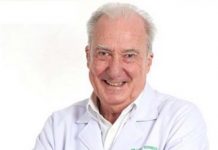Somber and staid are descriptions used for doctor’s surgeries. They are not thought of as places for humor. However, it has been shown to the satisfaction of the medical world, that humor and a good laugh really is good medicine. Some hospitals even employ clowns to brighten up the days of the inpatients. And no, I am not the clown.
However, one of my favorite jokes involves a parrot that was prone to ‘bad’ language, and consistently used the “F” word. After threatening the talkative bird with dire consequences, its owner put it in the freezer chest for five minutes. After being retrieved from the freezer, the parrot was asked if it would now behave. “Yes,” said the shivering parrot, “I won’t say the ‘F’ word again, but please tell me what did the effing chicken say?”
Now, the F word in medicine. Inappropriate use of the F word (there are some appropriate situations, in my mind at least) is part of an interesting condition known as Tourette’s Syndrome. These are involuntary movements (and sounds) and can be related to the magic “F” word, and is usually seen in children (not parrots) around the age of 5-7 years. Boys outnumber girls three to one!
So is this just a case of little Johnny parroting off (sorry about that, couldn’t help myself) dirty words he has heard at home? Actually no. This is a developmental problem that comes under the general heading of ‘Tics’ (as opposed to ‘ticks’ that are parasitic problems).
Tic disorders can affect up to almost 20 percent of children at some stage of their development. At one end of the spectrum are children with brief episodes of single tics, whereas at the other are children with chronic multiple tics, including our friend Tourette’s syndrome.
Tics are abrupt and recurrent involuntary motor or vocal actions. Motor tics include eye blinking, grimacing, nose twitching, lip pouting, shoulder shrugging, arm jerking, head jerking, kicking, finger movements, jaw snapping, tooth clicking, frowning, tensing parts of the body, and rapid jerking of any part of the body are simple tics. More complex ones include hopping, clapping, touching, throwing, arranging, gyrating, bending, biting the mouth, the lip, or the arm, head-banging, picking scabs, writhing movements, rolling eyes upwards or side-to-side, making funny expressions, sticking out the tongue, kissing, pinching, writing the same letter or word over and over, and tearing paper or books.
However the tic can also be vocal, with simple ones being coughing, spitting, screeching, barking, grunting, gurgling, clacking, whistling, hissing, sucking sounds, and syllable sounds such as “uh, uh,” “eee,” and “bu.” The complex vocal tics can involve complete phrases such as, “Oh boy,” “you know,” “shut up,” “you’re fat,” “all right,” and “what’s that.” Take that a little further and you get repetitive bad language (which we call Coprolalia, because we love big words) and that is the best known example of Tourette’s syndrome.
Children who have these tics can be looked upon as fools by their peers, and there is a no more predatory group than other children. Parents also can feel helpless in these situations. Form the medical point of view, one has to treat the entire family, not just little Johnny with the foul mouth!
Most children with tics can lead normal lives, and the tics themselves usually slow down in teenage years. Parents should be encouraged to get support for themselves from various organizations such as the Tourette Syndrome Association ([email protected]). With a good understanding of tics and related problems, including acceptance from teachers and education of the child’s peers, most children with tics do not need regular medical follow up.
Parents and children need to understand that, although all these symptoms relate to an underlying brain disorder, breaking the cycle may be extremely simple – for example, just allowing the child to have a short “tic break” in a long school lesson may be enough.
Drug treatment can be used, though there are differences in opinion on the efficacy, with some researchers claiming only 30 percent can be helped. However, tic severity and frequency can be reduced. Studies of Risperidone in Tourette’s syndrome have shown that it is efficacious too.




